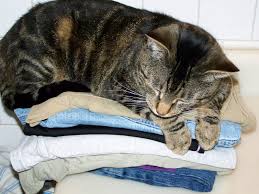By Fran Price (Goldfinch)
Provisional Psychologist & Resilience Coach
Why is it worth putting up with cat hair on the dining table or dog poo on the pavers out the back?
When the cat whinges to be fed every half an hour and the dog constantly lays sticks at your feet hoping you will throw them.
In our house, there’s a running joke of one of us exclaiming, “Who’d have pets?!” when they disgrace themselves or create extra work. There are many reasons why this has stayed a joke in our house as we love our cat and our dog. There are also many research studies that have focused on the benefits of having pets. For example McConnell et al. (2011) found that pets can serve as important sources of social support, providing many positive psychological and physical benefits for their owners. Here are some of the things the research has highlighted about pet ownership, with some of my own experiences mixed in.
Pets calm us down
 Think about sitting and watching a fish tank. There is something soothing about their activities in the tank, the colour and the patterns they make as they move around. You can even get screen savers of fake fish tanks! Watching the natural movement of animals, or their basic behaviours can provide a sense of rhythm and purpose, calming us down. Research has shown that pet owners have lower blood pressure and heart rate while performing stressful tasks and people recovering from a heart attack recover more quickly and survive longer when there is a pet at home (Borchard, 2013).
Think about sitting and watching a fish tank. There is something soothing about their activities in the tank, the colour and the patterns they make as they move around. You can even get screen savers of fake fish tanks! Watching the natural movement of animals, or their basic behaviours can provide a sense of rhythm and purpose, calming us down. Research has shown that pet owners have lower blood pressure and heart rate while performing stressful tasks and people recovering from a heart attack recover more quickly and survive longer when there is a pet at home (Borchard, 2013).
Exercise
Getting out and going for a walk. Pets, especially dogs, can be that bit of motivation needed to get out and do something. A study in the US (Bauman et al., 2008) found that dog owners were more likely to meet the  requirements of daily physical activity than non dog owners and there were fewer obese dog owners. As it comes into winter and daylight saving has finished, it takes more motivation to do something active outside work times, dogs can give you that adoring look that makes you get your sneakers and walk out the door.
requirements of daily physical activity than non dog owners and there were fewer obese dog owners. As it comes into winter and daylight saving has finished, it takes more motivation to do something active outside work times, dogs can give you that adoring look that makes you get your sneakers and walk out the door.
Companionship
Pets give unconditional love and want to be part of whatever is going on. Pets can also act as attachment figures, providing a sense of safe haven and reducing distress (Zilcha-Mano et al., 2012). Their unconditional love can provide affection when we most need it or simply be that smiling face at the end of a long day. It’s easy to see the look of devotion from dogs who want to be wherever you are all the time or the companionship of a warm cat curled up on your lap while you’re sitting on the couch in the evening. People say cats are aloof and they certainly have the potential to be like that, but there are definitely some very affectionate cats. I chose my cat from a litter of kittens at the RSPCA. He was the one climbing to the top of their scratching tower and back down again while playfully swiping at the tails of the othe r kittens. When I picked him up however, I held him at my chest and he stretched up and touched his nose to mine: A very affectionate trait he still pulls out. Despite the fact that he thinks he deserves the run of the house and has an annoying habit of finding freshly folded clean clothes to sleep on, he clearly enjoys being with us, and comes running when we get home, providing a lovely welcome.
r kittens. When I picked him up however, I held him at my chest and he stretched up and touched his nose to mine: A very affectionate trait he still pulls out. Despite the fact that he thinks he deserves the run of the house and has an annoying habit of finding freshly folded clean clothes to sleep on, he clearly enjoys being with us, and comes running when we get home, providing a lovely welcome.
Responsibility
Pets make us responsible for caring for something else. This can be great for kids as they grow up, learning what an animal needs and the fact that they are reliant on you providing it for them. Being responsible for a task  and taking ownership of completing it, gives us a sense of competence, even if it is cleaning the poo out of the guinea pigs’ cage. Pets also give structure to your day and mean you’re responsible to them to plan ahead if you’re going to be away.
and taking ownership of completing it, gives us a sense of competence, even if it is cleaning the poo out of the guinea pigs’ cage. Pets also give structure to your day and mean you’re responsible to them to plan ahead if you’re going to be away.
Connecting with others
Owning a pet can help you connect and be part of the community around you. A study of young people in the US found that those who owned pets were more likely to report contributing to their communities by helping their friends and neighbours (Mueller, 2014). There are also the social benefits of owning a pet that needs to be walked. Dogs in particular, due to their desire for exercise and stimulation, create opportunities for interactions and social contact in the broader community. Getting out and walking down the street with your dog or taking them to a dog park creates opportunities for you to meet and interact with other people in your local area. A study in Perth found that owning a pet was positively associated with social interactions both with other pet owners and the broader local community (Wood et al., 2005). Pet owners compared to non-pet owners, were also significantly less likely to report finding it hard to get to know people generally.
walked. Dogs in particular, due to their desire for exercise and stimulation, create opportunities for interactions and social contact in the broader community. Getting out and walking down the street with your dog or taking them to a dog park creates opportunities for you to meet and interact with other people in your local area. A study in Perth found that owning a pet was positively associated with social interactions both with other pet owners and the broader local community (Wood et al., 2005). Pet owners compared to non-pet owners, were also significantly less likely to report finding it hard to get to know people generally.
Watching people interact with their pets, you can see such positive connections and it’s lovely to be able to look at some of the research around some of the great things these connections are able to provide.
References
Bauman, A., Schroeder, J., Furber, S., &Dobson, A. (2001). The epidemiology of dog walking: An unmet need for human and canine health. Medical Journal of Australia, 175, 632-634.
Borchard, T. (2013). 6 Ways Pets Relieve Depression. Psych Central. Retrieved on April 26, 2014, from http://psychcentral.com/blog/archives/2013/05/19/6-ways-pets-relieve-depression/
McConnell, A. R., Brown, C. M., Shoda, T. M., Stayton, L. E., & Martin, C. E. (2011). Friends with benefits: On the positive consequences of pet ownership. Journal of Personality and Social Psychology, 6, 1239-1252.
Mueller, M.K. (2014). Is human-animal interaction (HAI) linked to positive youth development? Initial answers. Applied Developmental Science, 18 (1), 5-16
Wood, L., Giles-Corti, B., & Bulsara, M. (2005). The pet connection: Pets as a conduit for social capital? Social Science & Medicine 61, 1159-1173.
Zilcha-Mano, S., Mikulincer, M., & Shaver, P. R. (2012). Pets as safe havens and secure bases: The moderating role of pet attachment orientations. Journal of Research in Personality 46, 571-580.






